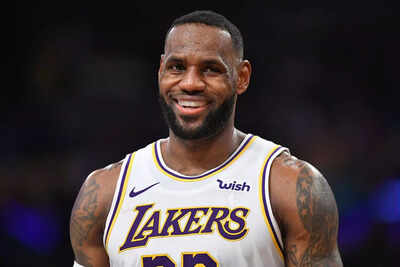ARTICLE AD BOX

Image via John McCoy/Getty
In a recent episode of the Mind the Game podcast, NBA icon LeBron James revealed a surprising detail about his training and dietary regimen: he doesn’t eat a full meal until well after practice, usually around 1:30 or 2:00 p.m.
Speaking with co-host and fellow basketball legend Steve Nash, James said, “I have either a green juice or some fruit or whatever the case may be, but I don’t eat a full meal until I get back home after practice. My first meal is usually around 1:30, 2 o’clock.”While James, now 40 and still performing at an elite level, appears to thrive on this routine, health professionals caution that this kind of intermittent fasting may not be suitable for most people.
Expert warns: ‘Not ideal for most active individuals’
Registered dietitian Melissa Mitri of Welltech weighed in on James’ eating strategy, telling the New York Post: “This type of nutrition routine is not ideal for most active individuals. A large body of research suggests that fueling both before and after exercise is beneficial for optimal performance, recovery, and muscle-building benefits.”Mitri explained that exercising on an empty stomach forces the body to use up carbohydrate reserves in the muscles and brain, which may cause fatigue, brain fog, and physical weakness.
“Depending on the amount of glycogen a person has, they can become depleted very quickly or more slowly,” she added.While acknowledging that James may be an exception, Mitri noted, “There is a small subset of people like LeBron that may perform well under fasting conditions, such as those who have a large amount of glycogen stores to pull from for energy.”She suggested that James’ body likely adapted over time to this fasted training method, possibly enduring a dip in performance during the adjustment period.
“It likely took time for his metabolism to adjust to exercising in a fasted state,” she said.
Hydration isn’t enough, warns dietitian
James also shared his hydration habits, noting he drinks two 64-ounce bottles of water daily. While applauding his commitment to hydration, Mitri clarified, “While hydration can support exercise performance, it is only going to get you so far in terms of endurance. Proper fuel is also essential to nourish hard-working muscles.”Although fasting may help those with digestive issues avoid discomfort during workouts, Mitri advised against completely skipping fuel. “This can be achieved with a little trial and error, which may involve consuming snacks or meals that are lower in fiber, fat, or liquid content to alleviate potential gastrointestinal discomfort,” she said.
Post-workout nutrition gets a thumbs-up
After training, James replenishes his energy with nutrient-dense choices like fruit smoothies or overnight oats.
Mitri approves, stating, “These are both quality options to have for recovery, as they contain a balance of carbohydrates and protein to replenish muscle glycogen stores.”She recommends that active adults prioritize post-exercise meals containing carbs, protein, and healthy fats as soon as possible to support recovery. Some of her top picks include Greek yogurt with fruit and whole-grain avocado toast.Mitri emphasized the importance of whole foods over supplements: “To support general health, a food-first approach is always best, as the combination of nutrients that work together in whole foods provides more benefits than single-nutrient supplements alone.”



.png)
.png)
.png)
















 1 week ago
13
1 week ago
13









 English (US) ·
English (US) ·